A Foodie’s Guide to Malaysian Campus Life
April 17, 2024
Anis
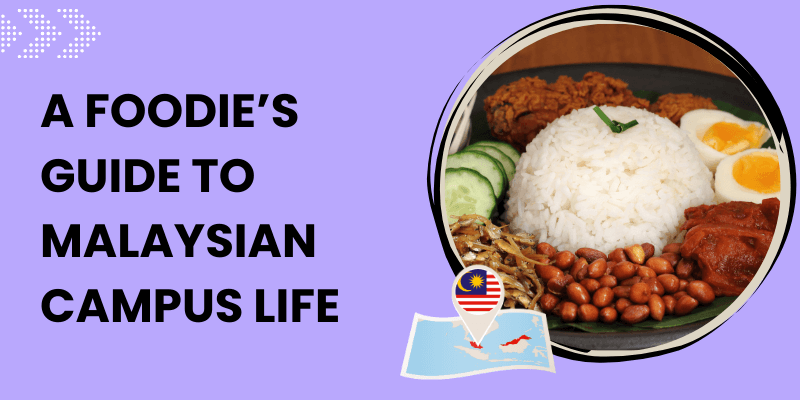
Malaysia isn't just one of the top spots for education; it is also a lively place with lots of different foods to try. Malaysia boasts a diversity of food that is a mix of flavors suitable for both local and international students.
Malaysian food offers a mix of flavors and textures that will excite your taste buds. It's a blend of different cultures and traditions that have influenced Malaysia's food over many years.
This mix of cultures has created a diverse range of dishes on university campuses. Students can enjoy authentic flavors from various cultures without going far.
Universities in Malaysia are not just places to study; they're also places where students can experience a variety of foods, reflecting the country's diverse cultural background.
So, are you ready to embark on a flavorful journey through Malaysian campus life?
Get ready to indulge in a culinary adventure like no other as we explore the diverse food options available in and around universities across Malaysia.
5 must-try foods for students on universities in Malaysia
These must-try foods are sure to leave you craving for more during your study days at universities in Malaysia:
1. Nasi Lemak
Nasi lemak is a traditional Malaysian dish that consists of fragrant rice cooked in coconut milk and pandan leaves, typically served with various accompaniments such as spicy sambal (a chili paste), crispy fried anchovies, roasted peanuts, sliced cucumber, and hard-boiled or fried eggs.
It is often considered Malaysia's national dish and is commonly eaten for breakfast but can be enjoyed at any time of the day. Nasi lemak is known for its rich flavors, combining sweetness from the coconut rice with spiciness from the sambal and saltiness from the anchovies.
2. Laksa
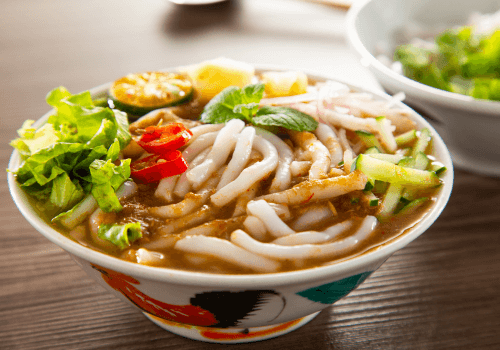
Laksa is a popular spicy noodle soup dish that is widely enjoyed in Southeast Asia, particularly in Malaysia, Singapore, and Indonesia. There are several regional variations of laksa, but it typically consists of thick rice noodles served in a flavorful, spicy coconut-based broth.
The broth is usually made with ingredients such as coconut milk, curry spices, lemongrass, galangal, chili paste, and various herbs and spices, giving it a rich and aromatic flavor profile.
Laksa often includes protein such as chicken, shrimp, or tofu, as well as additional toppings like bean sprouts, hard-boiled egg, sliced fish cake, and fresh herbs such as cilantro or laksa leaf.
3. Roti Canai
Treat your taste buds to the irresistible allure of Roti Canai, a flaky flatbread that's perfect for any time of day. Served with creamy curry sauce for dipping, this Malaysian food is crispy on the outside and soft on the inside. Whether enjoyed plain or with curry, Roti Canai is a true delight.
4. Char Kway Teow
Char kuey teow is a popular Malaysian dish that consists of stir-fried flat rice noodles cooked with a variety of ingredients and seasonings. It is commonly found in hawker stalls and food markets throughout Malaysia.
The dish typically includes rice noodles stir-fried with ingredients such as shrimp, eggs, bean sprouts, and sometimes cockles. The noodles are cooked in a hot wok with a flavorful mixture of soy sauce and chili paste for added depth of flavor.
5. Rendang
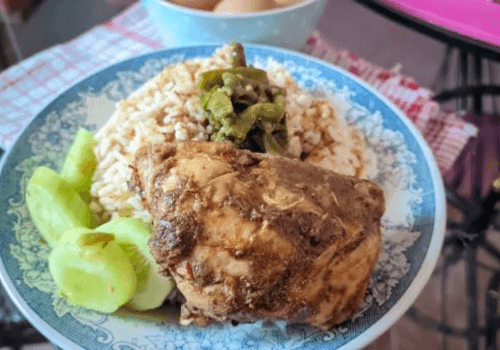
Rendang is a popular traditional Malaysian dish. It is a slow-cooked dry curry that features tender chunks of meat (typically beef, although chicken or lamb rendang also exist).
The meat is simmered in a rich and flavorful spice paste made from a blend of aromatic ingredients such as lemongrass, galangal, ginger, garlic, shallots, chili peppers, and various spices like turmeric, coriander, and cumin.
Coconut milk is added to the rendang mixture to give it a creamy texture and rich taste. The dish is cooked over low heat for several hours until the meat becomes tender.
During this slow cooking process, the sauce thickens, resulting in a deeply flavored and intensely aromatic dish. You can eat rendang together with Nasi Lemak or white rice.
Other than Malay food, what are other foods that cater to students?
Malaysian food culture is as diverse as its population, with influences from Malay, Chinese, Indian, and Western cuisines.
On campus, you can enjoy a wide variety of dishes that cater to international tastes. Halal options are also widely available, ensuring that students from diverse backgrounds can enjoy delicious meals together in a welcoming and inclusive environment.
1. Chinese cuisine
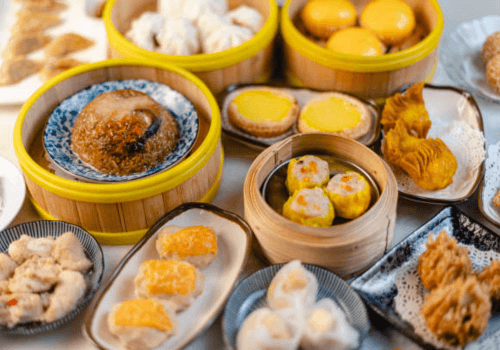
Chinese cuisine showcases a wide array of cooking techniques, including stir-frying, steaming, braising, deep-frying, and boiling. These techniques are employed to bring out the best in ingredients and create diverse textures and flavors.
Staple foods in Chinese cuisine include rice and noodles, which are often served alongside dishes or as main components of meals.
Rice can be prepared in various ways, such as steamed or fried, while noodles can be enjoyed in soups, stir-fries, or cold dishes.
Additionally, Chinese culinary culture encompasses the tradition of dim sum, which features small, bite-sized dishes served in bamboo steamers or on small plates.
Dim sum items range from savory dumplings and buns to sweet snacks, all meant to be savored alongside tea in a leisurely dining experience.
2. Indian curry cuisine
Indian curry cuisine represents a diverse and flavorful culinary tradition, comprising a wide range of dishes such as chicken curry. Renowned for its use of aromatic spices, creamy sauces, and fresh ingredients, it is a staple in many Indian households.
3. Korean cuisine
Korean cuisine has witnessed a surge in popularity across Malaysia in recent years, emerging as a beloved culinary option for Malaysians of diverse backgrounds.
Influenced by its rich culture and entertainment (drama and variety shows), Korean cuisine offers a captivating diversity of flavors and textures. Iconic dishes like kimchi, a fiery fermented cabbage, and bibimbap, a vibrant rice bowl topped with spicy gochujang sauce, delight taste buds and cater to the Malaysian palate's affinity for bold flavors.
Moreover, Korean street food has made a significant impact on the Malaysian food scene.
Favorites such as tteokbokki (spicy rice cakes), hotteok (sweet pancakes filled with brown sugar and nuts), and kimbap (seaweed rice rolls) have quickly gained popularity among locals, adding an exciting dimension to Malaysia's culinary landscape.
4. Western cuisine
Western food has become widely available at Malaysian universities, providing students with a range of Western dishes to choose from. Alongside classic favorites such as spaghetti bolognese and pizza, there are also healthier options, such as salads and wraps, which are popular among students seeking balanced and nutritious meals.
Additionally, fusion dishes that combine Western cooking styles with Asian ingredients and spices add to the variety of flavors offered on campus.
5. Japanese cuisine
Japanese cuisine has left a notable impression on Malaysian campuses, providing students with a taste of Japan's rich and diverse culinary traditions. This culinary influence has gained popularity among students who are drawn to its fresh flavors.
For instance, sushi has become a staple favorite among Malaysian students. Its delicate balance of vinegared rice, fresh fish, and seaweed creates a harmonious and satisfying dining experience.
Many university kiosks or cafeterias in Malaysia also provide onigiri, rice formed into triangular shapes and typically wrapped in seaweed, at a reasonable price.
While the portion may be small, these onigiri are complete with a choice of protein, making them a perfect and convenient snack before heading to class.
6. Indonesian cuisine
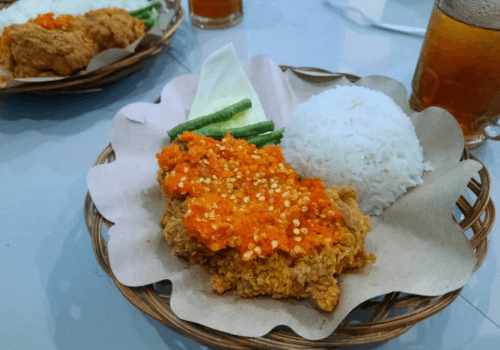
Indonesian cuisine has found a significant presence on Malaysian campuses, offering students a delightful culinary journey through the diverse flavors and rich traditions of Indonesia.
With its blend of spices, herbs, and fresh ingredients, Indonesian cuisine captivates the students' palate and provides a taste of the vibrant culinary landscape of its neighboring country.
Indonesian cuisine also embraces the use of bold and aromatic spices such as turmeric, ginger, lemongrass, and galangal, which infuse dishes with layers of flavor.
Some of the popular and affordable Indonesian dishes are Nasi Ayam Gepuk, Nasi Geprek, and Bakso. These dishes are fulfilling and satisfying, making them a favorite choice among students for a hearty meal on campus.
Are these foods affordable for students at universities in Malaysia?
Worried about managing your expenses while dining on campus?
Fear not, as universities in Malaysia offer a wide range of affordable dining options that cater to students' budgets without compromising on taste.
These campuses are equipped with budget-friendly canteens, cafeterias, and eateries that serve a variety of affordable meals.
Students can enjoy filling meals for as low as RM7, making it a convenient option for those on a tight budget.
Whether you're in the mood for a quick bite between classes or a leisurely meal with friends, food stalls and street vendors provide convenient and affordable dining options.
Also read: A Day in the Life of an International Student in Malaysia
What are the social aspects of dining and food culture among students in Malaysian universities?
Food has a remarkable ability to transcend cultural boundaries and forge connections between people, and this rings especially true in the vibrant atmosphere of Malaysian universities.
Dining isn't just about satisfying hunger; it's a “social ritual” that brings students together, fostering friendships and camaraderie in a melting pot of culinary diversity.
At universities in Malaysia, mealtime isn't merely a solitary affair; it's an opportunity for students to gather and bond over shared experiences.
Whether it's grabbing a quick bite between classes or sitting down for a leisurely meal with friends, dining becomes a cornerstone of social interaction on campus.
The communal atmosphere of university dining areas buzzes with conversation and laughter as students from diverse backgrounds come together to enjoy a meal.
Moreover, dining experiences in Malaysia's universities often extend beyond the confines of campus eateries.
Students frequently venture out into the surrounding neighborhoods to explore the local food scene, discovering hidden gems and indulging in culinary adventures together.
Whether it's exploring night markets or seeking out hole-in-the-wall eateries, these shared food expeditions become cherished memories that strengthen friendships and create lifelong bonds.
In conclusion, Malaysian campus life isn't just about academics; it's a journey into a world of culinary delights that promises to satisfy every palate.
With a vibrant tapestry of flavors and a myriad of dining options, students are treated to an unforgettable culinary experience that reflects the diversity and richness of Malaysian culture.
So, whether you're craving the comforting warmth of traditional Malay dishes, the bold flavors of Chinese cuisine, the aromatic spices of Indian fare, or the familiar tastes of Western favorites, Malaysian campuses have something for everyone.
It's a gastronomic adventure waiting to be explored, where every meal is a celebration of diversity and a testament to the vibrant food culture that thrives within university walls.
As you navigate through the bustling food stalls, bustling canteens, and cozy eateries of Malaysian campuses, remember to prepare your appetite, keep an open mind, and dive fearlessly into the world of Malaysian cuisine. Selamat makan! (Enjoy your meal!)
Kickstart your education in Malaysia
We'll help you find and apply for your dream university
You might be interested in...
- What to Do After IGCSE/O-Level? Best Study Pathways in Malaysia
- Xiamen University Malaysia Scholarships for International Students in 2025
- Why AI in Education Matters?
- Sunway University Ranked Malaysia's No. 1 Private University in 2025
- A Sunway University Student's Journey from Cerebral Palsy to Graduation
- APU Dominates the 2024 Private Education Excellence Awards with Dual Wins
- The Young & the Wired: How Youth are Redefining the Digital Era?
- Promoting Inclusivity at Malaysian Universities: Tips for Malaysian and International Students
- Taking IELTS test in Malaysia: Tips, Tricks, and Key Info
- Sunway University Tops Times Higher (THE) Rankings in Malaysia
 +60142521561
+60142521561





